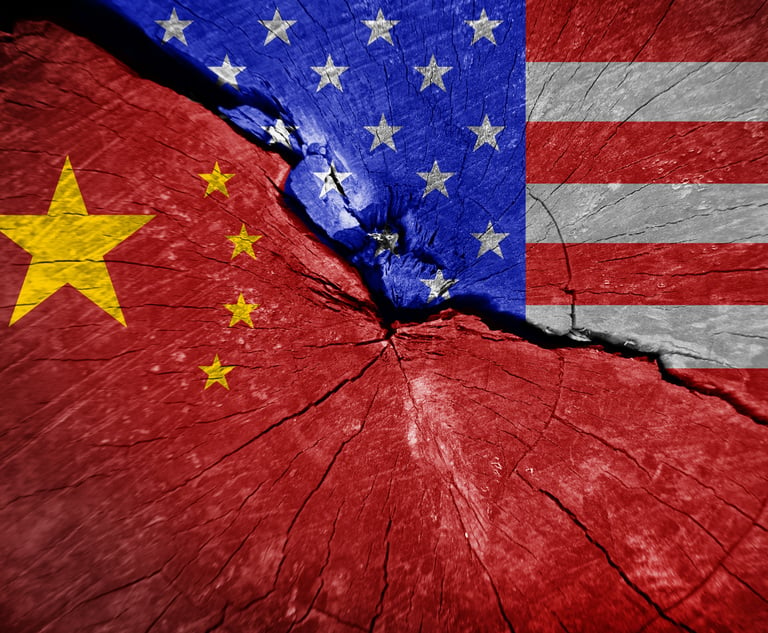
Trump and China: Lawyers Warn of Risk to the Practice of Law
China-focused lawyers in the U.S. and China say geopolitics and the exodus of foreign law firms from Greater China have had a chilling effect on the practice of law. But with Trump’s triumph in America, they warn that it may get a lot worse.
November 10, 2024 at 12:21 PM
7 minute read
Editor’s note: This is the first in a three-part series on the impact of U.S.-China tensions on the China legal market.
Now that the U.S. election has been decided, lawyers doing China-related work say one thing is clear: The fraught relationship between Beijing and Washington is likely to continue unabated and could deteriorate further.
Newly anointed U.S. President Donald Trump is almost certainly set to further antagonize Beijing, lawyers in China say. He has already pledged to raise tariffs by a stiff 60% on Chinese imports, potentially setting off a massive trade war.
For lawyers at both foreign and Chinese firms, the friction between the world’s two largest economies is troubling. It has prompted scores of top U.S. law firms to close offices in Greater China. It has resulted in laws and regulations that create ambiguity and a lack of transparency when doing business. And it has altered the relationship between U.S. and Chinese law firms, shifting the dynamic and even the balance of power to firms that sometimes struggle to rise to the tasks now suddenly required of them.
Over the past two years, scores of top American law firms, including Weil Gotshal & Manges, Dechert, Sidley Austin, Morrison Foerster, Latham & Watkins and Skadden Arps Slate Meagher & Flom, have pulled up stakes or reduced their presence in mainland China. U.S. law firms, intent on improving their profits, grew tired of maintaining offices in Greater China that had long been considered loss leaders as corporate and capital markets work dried up.
These firms had weathered down markets before, but this time was different. They saw work largely disappear as friction between the U.S. and China intensified and showed no signs of abating.
“I would say the changing geopolitical relations between China and the U.S. is without question the most fundamental reason driving the withdrawal of U.S. firms from China,” said Warren Hua, managing partner at top Chinese law firm JunHe.
Lawyers in the Dark
Beijing’s dogged focus on national security and data security means that exporting information from China is not only heavily scrutinized but in some cases, prohibited. That has made advising clients incredibly onerous, lawyers told Law.com International.
“Fifteen years ago, I could do an internal investigation in China, meet with the Beijing public prosecutor, take documents out of China, interview people in China, and there was very little concern,” said Martin Weinstein, a U.S.-based partner at Cadwalader Wickersham & Taft, which shuttered its offices in Hong Kong and Beijing in 2016. “Now, I worry about running afoul of the Chinese government.”
Last year, Beijing fined Mintz Group, an American corporate due diligence firm, $1.5 million for allegedly conducting unapproved statistical work in the country. It said Mintz had carried out “foreign-related statistical investigations” without seeking and obtaining approvals. Chinese authorities also raided American consulting firm Capvision over national security concerns and accused the company of leaking sensitive military information to foreign forces.
In addition, the steady flow of new Chinese regulations, especially those dealing with Chinese state security and data privacy regulations that often conflict with U.S. law—has made it difficult for lawyers to know how to advise clients.
Meanwhile, law firm clients complain that the ability to monitor their Chinese operations and comply with the books and records provision of the U.S. Foreign Corrupt Practices Act is dramatically limited when information cannot come out of China, Weinstein said.
To be sure, data privacy and security laws are not exclusive to China. But there is an underlying opacity in China that is incredibly difficult to navigate, he added.
“We've had situations where the U.S. government is … asking for documents, and the Chinese law specifically says if you bring documents from China and hand them to the U.S. government, that's a violation of Chinese law,” Weinstein said. “That puts everybody in a difficult position.”
One U.S. law firm partner who was until recently based in Hong Kong but has relocated to New York also said access to Chinese regulators and seeking clarification on processes have become much less straightforward.
“We often just don’t hear back. It’s complete darkness,” the partner said. “How anyone can be expected to serve clients properly under those circumstances, I don’t know.”
Changing Law Firm Dynamics
In July, Beijing revised its state secrets law, modifying curbs on how government officials handle confidential information and forbidding those entrusted with state secrets from traveling overseas without approval. Foreign lawyers say this has created increased uncertainty and compliance issues for businesses in China. What constitutes “secrets” under the law is not at all clear and is susceptible to expansive interpretation.
Weinstein says foreign law firms like his used to take the lead on U.S. and China investigations. But the many new laws and regulations and a lack of access to regulators have made it crucial that he “lean on” his Chinese counterparts—firms and lawyers he has worked alongside for years—to interpret the mindset, mentality, attitude and economic policies of the Chinese government.
When issues surrounding the state secrets law arise, for example, Weinstein says he has no choice but to defer to his counterparts on the mainland to service his clients effectively
“I trust my Chinese colleagues,” he said. “I probably have worked with the same two practitioners for many years, so I've grown to have a personal and professional relationship with them. “I trust their judgment, and I have to rely on it.”
But Chinese lawyers are feeling their own limitations.
Opportunity or Risk?
Like Weinstein, Gary Gao, a Shanghai-based partner at Zhong Lun Law Firm, said Chinese lawyers are now being forced to step up on complex cross-border investigations involving Chinese assets. Now, they are the ones being asked to identify what constitutes a state secret or important data, and whether such data can be transferred overseas, Gao said.
The answers are not clear-cut, however, and Chinese lawyers admit that most China-based law firms neither have the capacity nor the technical capability to advise on these complex, high profile, high stakes cross-border investigations.
To be sure, a few China-based domestic law firms do have substantial cross-border experience and have over the past decade built reputations advising on cross-border transactions—firms such as JunHe, Zhong Lun, Fangda Partners, Han Kun Law Offices, Haiwen Partners and King & Wood Mallesons.
But not even all of these firms are equipped to lead on major investigative matters.
“Maybe it's time for [law firms in China] to improve the quality of our legal services and industry,” said Gao. “This is an opportunity for leading lawyers and leading law firms to really qualify themselves, improve themselves.”
This would not be a fruitless endeavor, he said, as lawyers foresee increasing regulatory risks and challenges for Chinese companies—not just from the U.S. but also from Europe. And demand for skilled Chinese lawyers will also grow as Western clients’ frustrations with China’s regulations mount. “They are becoming more and more impatient,” Gao said.
In the meantime, a few international firms have found value in having a China presence. Last year, Quinn Emanuel Urquhart & Sullivan launched an office in Beijing, citing growth in U.S. investigations of Chinese companies.
Whereas it had previously focused mostly on representing multinational companies in China, the firm has pivoted and its clientele on the ground is now primarily Chinese companies. Quinn Emanuel advised Chinese ride-hailing giant DiDi on its securities suits in the U.S., and previously also acted for Alibaba Group Holdings and some of China's prized financial institutions—Bank of China and the Industrial and Commercial Bank of China.
Even U.S. firms that no longer have offices in China believe there’s still room to play. They do not expect to see an easing of U.S.-China tensions any time soon. In fact, they predict with Trump as president, they may well get worse. This, they say, will create more need for their services.
“From our perspective, we're really leaning into China because we have very strong relationships there,” said Cadwalader’s Weinstein. “China and the U.S. are the two largest economies in the world. We’re not going to disengage from each other.”
NOT FOR REPRINT
© 2025 ALM Global, LLC, All Rights Reserved. Request academic re-use from www.copyright.com. All other uses, submit a request to [email protected]. For more information visit Asset & Logo Licensing.
Related Stories
View AllYou Might Like
View All
Jones Day Names New Practice Leaders in Brussels, Latin America and the US

Lawyers React To India’s 2025 Budget, Welcome Investment And Tax Reform

BCLP Joins Crowded Saudi Legal Market with Plans to Open Two Offices
3 minute readTrending Stories
- 1DC Circuit Keeps Docs in Judge Newman's Misconduct Proceedings Sealed
- 2Litigators of the Week: US Soccer and MLS Fend Off Claims They Conspired to Scuttle Rival League’s Prospect
- 3Litigator of the Week Runners-Up and Shout-Outs
- 4U.S.- China Trade War: Lawyers and Clients Left 'Relying on the Governments to Sort This Out'
- 5Willkie Adds Five-Lawyer Team From Quinn Emanuel in Germany
Who Got The Work
J. Brugh Lower of Gibbons has entered an appearance for industrial equipment supplier Devco Corporation in a pending trademark infringement lawsuit. The suit, accusing the defendant of selling knock-off Graco products, was filed Dec. 18 in New Jersey District Court by Rivkin Radler on behalf of Graco Inc. and Graco Minnesota. The case, assigned to U.S. District Judge Zahid N. Quraishi, is 3:24-cv-11294, Graco Inc. et al v. Devco Corporation.
Who Got The Work
Rebecca Maller-Stein and Kent A. Yalowitz of Arnold & Porter Kaye Scholer have entered their appearances for Hanaco Venture Capital and its executives, Lior Prosor and David Frankel, in a pending securities lawsuit. The action, filed on Dec. 24 in New York Southern District Court by Zell, Aron & Co. on behalf of Goldeneye Advisors, accuses the defendants of negligently and fraudulently managing the plaintiff's $1 million investment. The case, assigned to U.S. District Judge Vernon S. Broderick, is 1:24-cv-09918, Goldeneye Advisors, LLC v. Hanaco Venture Capital, Ltd. et al.
Who Got The Work
Attorneys from A&O Shearman has stepped in as defense counsel for Toronto-Dominion Bank and other defendants in a pending securities class action. The suit, filed Dec. 11 in New York Southern District Court by Bleichmar Fonti & Auld, accuses the defendants of concealing the bank's 'pervasive' deficiencies in regards to its compliance with the Bank Secrecy Act and the quality of its anti-money laundering controls. The case, assigned to U.S. District Judge Arun Subramanian, is 1:24-cv-09445, Gonzalez v. The Toronto-Dominion Bank et al.
Who Got The Work
Crown Castle International, a Pennsylvania company providing shared communications infrastructure, has turned to Luke D. Wolf of Gordon Rees Scully Mansukhani to fend off a pending breach-of-contract lawsuit. The court action, filed Nov. 25 in Michigan Eastern District Court by Hooper Hathaway PC on behalf of The Town Residences LLC, accuses Crown Castle of failing to transfer approximately $30,000 in utility payments from T-Mobile in breach of a roof-top lease and assignment agreement. The case, assigned to U.S. District Judge Susan K. Declercq, is 2:24-cv-13131, The Town Residences LLC v. T-Mobile US, Inc. et al.
Who Got The Work
Wilfred P. Coronato and Daniel M. Schwartz of McCarter & English have stepped in as defense counsel to Electrolux Home Products Inc. in a pending product liability lawsuit. The court action, filed Nov. 26 in New York Eastern District Court by Poulos Lopiccolo PC and Nagel Rice LLP on behalf of David Stern, alleges that the defendant's refrigerators’ drawers and shelving repeatedly break and fall apart within months after purchase. The case, assigned to U.S. District Judge Joan M. Azrack, is 2:24-cv-08204, Stern v. Electrolux Home Products, Inc.
Featured Firms
Law Offices of Gary Martin Hays & Associates, P.C.
(470) 294-1674
Law Offices of Mark E. Salomone
(857) 444-6468
Smith & Hassler
(713) 739-1250









